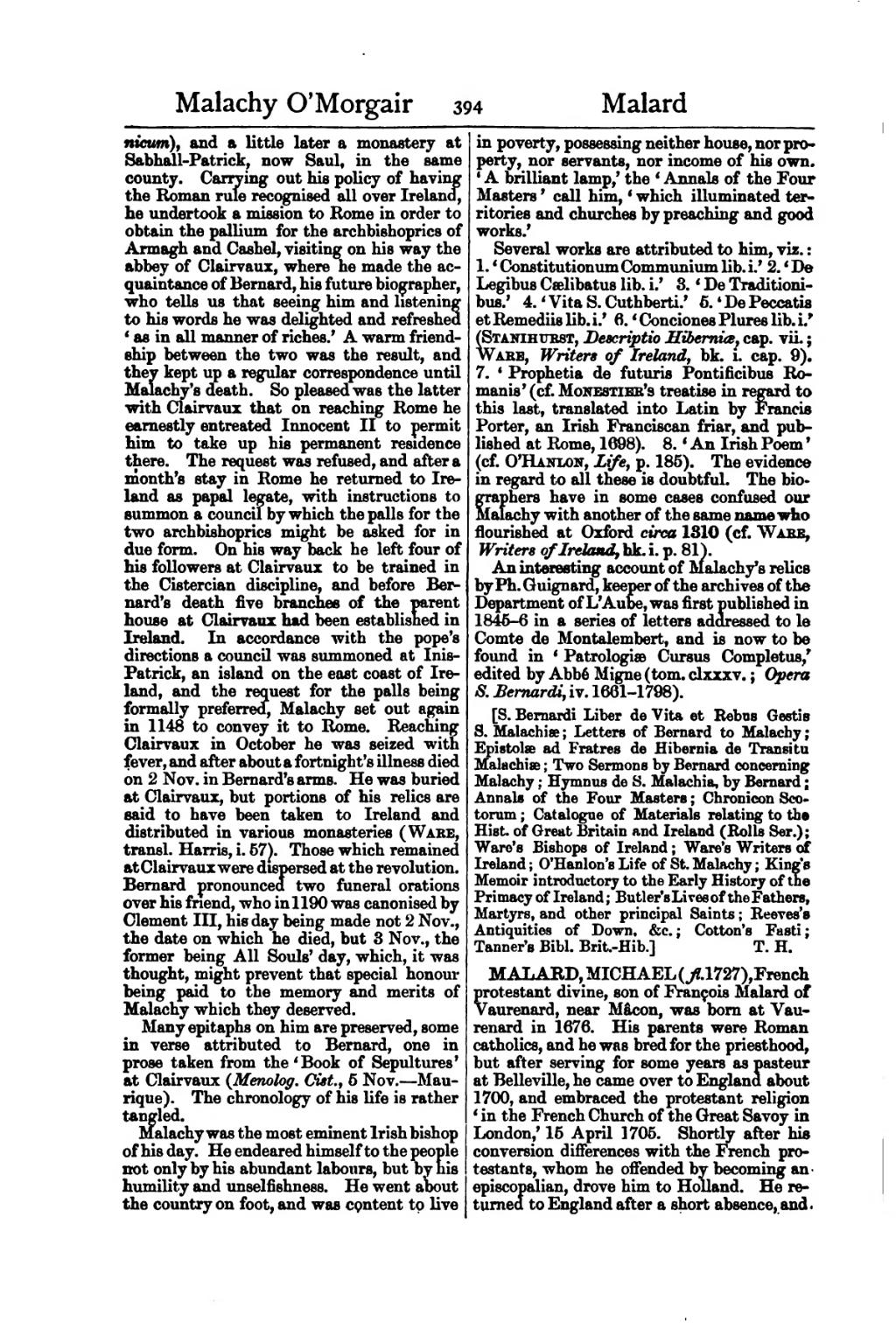nicum), and a little later a monastery at Sabhall-Patrick, now Saul, in the same county. Carrying out his policy of having the Roman rule recognised all over Ireland, he undertook a mission to Rome in order to obtain the pallium for the archbishoprics of Armagh and Cashel, visiting on his way the abbey of Clairvaux, where he made the acquaintance of Bernard, his future biographer, who tells us that seeing him and listening to his words he was delighted and refreshed ‘as in all manner of riches.’ A warm friendship between the two was the result, and they kept up a regular correspondence until Malachy's death. So pleased was the latter with Clairvaux that on reaching Rome he earnestly entreated Innocent II to permit him to take up his permanent residence there. The request was refused, and after a month's stay in Rome he returned to Ireland as papal legate, with instructions to summon a council by which the palls for the two archbishoprics might be asked for in due form. On his way back he left four of his followers at Clairvaux to be trained in the Cistercian discipline, and before Bernard's death five branches of the parent house at Clairvaux had been established in Ireland. In accordance with the pope's directions a council was summoned at Inis-Patrick, an island on the east coast of Ireland, and the request for the palls being formally preferred, Malachy set out again in 1148 to convey it to Rome. Reaching Clairvaux in October he was seized with fever, and after about a fortnight's illness died on 2 Nov. in Bernard's arms. He was buried at Clairvaux, but portions of his relics are said to have been taken to Ireland and distributed in various monasteries (Ware, transl. Harris, i. 57). Those which remained at Clairvaux were dispersed at the revolution. Bernard pronounced two funeral orations over his friend, who in 1190 was canonised by Clement III, his day being made not 2 Nov., the date on which he died, but 3 Nov., the former being All Souls' day, which, it was thought, might prevent that special honour being paid to the memory and merits of Malachy which they deserved.
Many epitaphs on him are preserved, some in verse attributed to Bernard, one in prose taken from the ‘Book of Sepultures’ at Clairvaux (Menolog. Cist., 5 Nov.—Maurique). The chronology of his life is rather tangled.
Malachy was the most eminent Irish bishop of his day. He endeared himself to the people not only by his abundant labours, but by his humility and unselfishness. He went about the country on foot, and was content to live in poverty, possessing neither house, nor property, nor servants, nor income of his own. ‘A brilliant lamp,’ the ‘Annals of the Four Masters’ call him, ‘which illuminated territories and churches by preaching and good works.’
Several works are attributed to him, viz.: 1. ‘Constitutionum Communium lib. i.’ 2. ‘De Legibus Cælibatus lib. i.’ 3. ‘De Traditionibus.’ 4. ‘Vita S. Cuthberti.’ 5. ‘De Peccatis et Remediis lib. i.’ 6. ‘Conciones Plures lib. i.’ (Stanihurst, Descriptio Hiberniæ, cap. vii.; Ware, Writers of Ireland, bk. i. cap. 9). 7. ‘Prophetia de futuris Pontificibus Romanis’ (cf. Monestier's treatise in regard to this last, translated into Latin by Francis Porter, an Irish Franciscan friar, and published at Rome, 1698). 8. ‘An Irish Poem’ (cf. O'Hanlon, Life, p. 185). The evidence in regard to all these is doubtful. The biographers have in some cases confused our Malachy with another of the same name who flourished at Oxford circa 1310 (cf. Ware, Writers of Ireland, bk. i. p. 81).
An interesting account of Malachy's relics by Ph. Guignard, keeper of the archives of the Department of L'Aube, was first published in 1845–6 in a series of letters addressed to le Comte de Montalembert, and is now to be found in ‘Patrologiæ Cursus Completus,’ edited by Abbé Migne (tom. clxxxv.; Opera S. Bernardi, iv. 1661–1798).
[S. Bernardi Liber de Vita et Rebus Gestis S. Malachiæ; Letters of Bernard to Malachy; Epistolæ ad Fratres de Hibernia de Transitu Malachiæ; Two Sermons by Bernard concerning Malachy; Hymnus de S. Malachia, by Bernard; Annals of the Four Masters; Chronicon Scotorum; Catalogue of Materials relating to the Hist. of Great Britain and Ireland (Rolls Ser.); Ware's Bishops of Ireland; Ware's Writers of Ireland; O'Hanlon's Life of St. Malachy; King's Memoir introductory to the Early History of the Primacy of Ireland; Butler's Lives of the Fathers, Martyrs, and other principal Saints; Reeves's Antiquities of Down, &c.; Cotton's Fasti; Tanner's Bibl. Brit.-Hib.]
MALARD, MICHAEL (fl. 1727), French protestant divine, son of François Malard of Vaurenard, near Mâcon, was born at Vaurenard in 1676. His parents were Roman catholics, and he was bred for the priesthood, but after serving for some years as pasteur at Belleville, he came over to England about 1700, and embraced the protestant religion ‘in the French Church of the Great Savoy in London,’ 15 April 1705. Shortly after his conversion differences with the French protestants, whom he offended by becoming an episcopalian, drove him to Holland. He returned to England after a short absence, and
